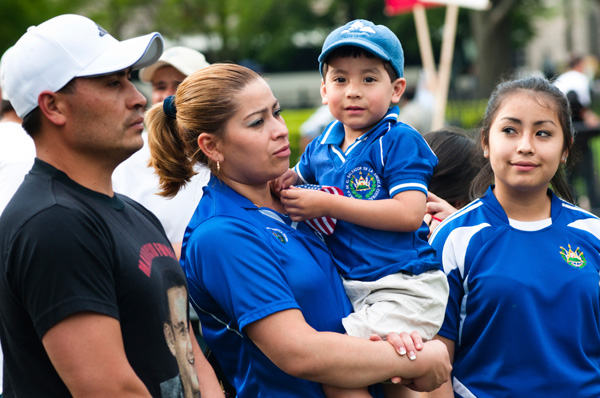- La Feria Community Holds Succesful Business Mixer Event
- Little Nashville to Take Place in Downtown Mercedes
- Lions Basketball Captures District Gold
- La Feria ISD Students Compete in Regional Chess Tournament
- Lions End First Half of 32-4A on a High Note
- La Feria ISD Held Another Successful Parent Conference
- Strong Appearance for Lions at Hidalgo Power Meet
- LFECHS Students Get to Meet Local Actress
- Students Participate in Marine Biology Camp
- Two LFECHS Students Qualify for All-State Band
Women and Faith Communities Continue March Inspired by Pope
- Updated: October 23, 2015
by Eric Galatas
AUSTIN, Texas – When Pope Francis called for the globalization of compassion and cooperation, 100 women from across the U.S. marched 100 miles to the nation’s capital to amplify that message during the pontiff’s recent visit and they’re still marching.
This past Sunday, faith-based activists in south Texas took to the streets, kicking off a series of monthly demonstrations.
Hector Lopez, coordinator with the Fuerza Del Valle Workers Center and South Texas Civil Rights Project, says communities are taking action to win dignity, respect and justice for those most vulnerable in our society.
“The fact the majority of migrants, immigrants in the U.S. are women and children and we as a society have a responsibility to take care of migrants, refugees, immigrants,” says Lopez.
Each of the 100 women who marched to Washington to greet the pope are committed to marching another hundred miles in their respective communities. Lopez says actions will take place on the 11th of each month, over the course of 11 months, seeking justice for the nation’s 11 million undocumented workers.

Faith-based communities are marching to keep the pope’s call for globalizing compassion and cooperation alive in south Texas and across the nation. Photo: Rrodrickbeiler/iStockphoto
Lopez says immigrants are increasingly vulnerable in the wake of recent remarks from GOP presidential candidates. In August, according to Atlantic magazine, one of two men who allegedly attacked a homeless Hispanic man in Boston said it was Donald Trump’s comments on immigration that motivated the beating.
Lopez says he’s hopeful that Sunday’s demonstrations show communities across the U.S. support families and workers who play a vital role in our economy.
“A very important sector, when we talk about undocumented workers because they take care of children, take care of elderly – the domestic workers – or the agricultural workers that are harvesting our food,” says Lopez.
The National Domestic Workers Alliance is helping organize the monthly marches as part of their “We Belong Together” campaign. Lopez says the campaign was launched to free mothers and their children from detention centers, keep families together without fear of deportation, and to end the deaths along the U.S.-Mexico border of people trying to reach a better life.


